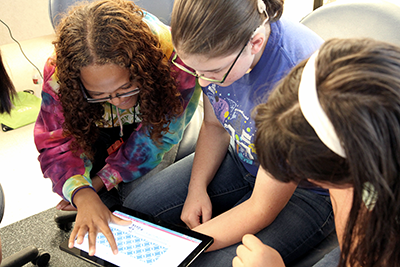University of Washington AccessComputing Faculty Co-Found New Research Center Devoted to Accessible Technology

At Microsoft’s annual Ability Summit in May 2020, University of Washington President Ana Marie Cauce and Microsoft President Brad Smith announced the founding of CREATE, the UW Center for Research and Education on Accessible Technology and Experiences. CREATE was co-founded by UW faculty from multiple colleges, including center Co-Director Jacob O. Wobbrock (The Information School) and Director for Education Richard Ladner (Computer Science & Engineering), both from AccessComputing. Other founding faculty members are center Co-Director Jennifer Mankoff (Computer Science & Engineering), Director for Translation Anat Caspi (The Taskar Center), and Associate Directors Heather Feldner (Rehabilitation Medicine), Leah Findlater (Human-Centered Design & Engineering), James Fogarty (Computer Science & Engineering), Jon Froehlich (Computer Science & Engineering), and Kat Steele (Mechanical Engineering). Together, these nine faculty members successfully inspired Microsoft with the idea of starting a center devoted to the design, development, and deployment of next-generation accessible technologies. The center is also devoted to educating the next generation of designers, engineers, and I.T. specialists with the awareness and skills to ensure the technologies they create and manage are accessible. Microsoft generously agreed to fund CREATE with an inaugural gift of $2.5M. CREATE aims to raise an additional $7.5M from private donors, other companies, and grants, on its way to becoming a high-powered self-sustaining research center with global impact.
CREATE’s stated mission is “to make technology accessible and to make the world accessible through technology.” CREATE faculty pursue projects along both of these lines. For example, in the first line of work, Prof. Wobbrock was part of a team that helped make touch screens accessible by inventing Slide Rule, the world’s first finger-driven screen reader, in 2007. More recently, a research team including Profs. Richard Ladner, James Fogarty, and Wobbrock created GestureCalc, an eyes-free calculator for touch screens. In the second line of work, Prof. Jon Froehlich has created Project Sidewalk to use crowdsourcing and machine learning to gather and present outdoor navigation information, particularly the accessibility of sidewalks. Dr. Anat Caspi has a similar project called AccessMap, which provides personalized automated pedestrian routing. Prof. Jennifer Mankoff conducts research on consumer-grade fabrication technology, such as low-cost 3D printing, and how this technology can be used to meet do-it-yourself or do-for-others accessibility challenges. CREATE faculty are already internationally recognized for their contributions to assistive technology and accessible computing research; by bringing them together under one organizational roof, CREATE will enable synergies and foster collaborations that enable faculty and students to become more than the sum of their parts.
CREATE is not only a research center, but also focuses on education and translation. With education, CREATE focuses on training the next generation of technology professionals to prioritize the creation of accessible technologies. CREATE’s founders are mostly engineers and the center’s education efforts will borrow heavily from engineering disciplines. With translation, CREATE focuses on ensuring the center’s research breakthroughs will find their way into the lives of people that can benefit from them. Translation opportunities might involve getting the latest research into companies, establishing licensing arrangements, forming open source projects, supporting do-it-yourself communities, or holding workshops for communicating best practices. Both education and translation will allow the work of CREATE faculty and students to have far-reaching impact for years to come.
CREATE is just getting started, but plans are underway to have students at every degree level involved in CREATE’s activities. CREATE founders are working hard to develop an industry affiliates program, technology demo days, a career fair, student scholarships, travel support, and even an endowed professorship, among other initiatives. CREATE also hopes to engage with advocacy on campus and beyond for people with disabilities and the importance of technology being accessible. For more information, please visit the CREATE website.